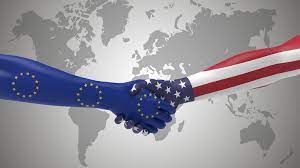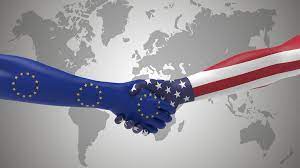
The European Union and the United States declared on Friday that they had reached a "in principle" agreement on a new framework for cross-border data transfers, bringing much-needed respite to internet behemoths like Meta and Google.
For more than a year, authorities on both sides of the Atlantic have been negotiating a replacement for the so-called Privacy Shield, an agreement that allows companies to exchange Europeans' data with the US.
In July 2020, the Privacy Shield was declared invalid, dealing a blow to Facebook and other corporations that had relied on the system for EU-US data exchanges. The European Union's highest court sided with Max Schrems, an Austrian privacy activist who argued that the present framework did not protect Europeans against US spying.
“This framework underscores our shared commitment to privacy, to data protection, and to the rule of law,” President Joe Biden said Friday, adding the smooth flow of data would “help facilitate $7.1 trillion in economic relationships with the EU.”
The new deal will "allow predictable and trustworthy data transfers between the EU and the US, respecting privacy and civil liberties," European Commission President Ursula von der Leyen said on Friday, without going into much detail about how it will function.
The deal will provide some relief to Meta and a number of other companies that have suffered legal uncertainty about how they transport data across borders since the decision to dismantle Privacy Shield. Meta had indicated that due to the issue, Facebook and Instagram may have to be shut down in Europe.
Nick Clegg, Meta’s president of global affairs, said the deal “will provide invaluable certainty for American & European companies of all sizes, including Meta, who rely on transferring data quickly and safely.”
“With concern growing about the global internet fragmenting, this agreement will help keep people connected and services running,” he said on Twitter.
Kent Walker, Google's head of worldwide relations, praised the news as well.
“People want to be able to use digital services from anywhere in the world and know that their information is safe and protected when they communicate across borders,” Walker said in an emailed statement.
“We commend the work done by the European Commission and U.S. government to agree on a new EU-U.S. framework and safeguard transatlantic data transfers.”
(Source:
However, Guillaume Couneson, a data protection partner at law firm Linklaters, warned it was too early to say whether the new agreement stands the test of time. Privacy Shield itself was the replacement for Safe Harbor, an earlier EU-U.S. data pact.
“This new solution will have to withstand the scrutiny of the supervisory authorities and the privacy activists that brought down the two previous ones,” Couneson said.
Schrems, who was instrumental in bringing down both the Privacy Shield and Safe Harbor, said the “final text” of the new agreement would take more time to come through. But, he added he’s prepared to challenge it “if it is not in line with EU law.”
“In the end, the [EU] Court of Justice will decide a third time. We expect this to be back at the Court within months from a final decision,” Schrems said in a statement.
The deal was announced alongside a separate agreement with the U.S. to provide energy to Europe as the Russian invasion of Ukraine threatens to disrupt the continent’s energy supplies.
(Source:www,cnbc.com)
For more than a year, authorities on both sides of the Atlantic have been negotiating a replacement for the so-called Privacy Shield, an agreement that allows companies to exchange Europeans' data with the US.
In July 2020, the Privacy Shield was declared invalid, dealing a blow to Facebook and other corporations that had relied on the system for EU-US data exchanges. The European Union's highest court sided with Max Schrems, an Austrian privacy activist who argued that the present framework did not protect Europeans against US spying.
“This framework underscores our shared commitment to privacy, to data protection, and to the rule of law,” President Joe Biden said Friday, adding the smooth flow of data would “help facilitate $7.1 trillion in economic relationships with the EU.”
The new deal will "allow predictable and trustworthy data transfers between the EU and the US, respecting privacy and civil liberties," European Commission President Ursula von der Leyen said on Friday, without going into much detail about how it will function.
The deal will provide some relief to Meta and a number of other companies that have suffered legal uncertainty about how they transport data across borders since the decision to dismantle Privacy Shield. Meta had indicated that due to the issue, Facebook and Instagram may have to be shut down in Europe.
Nick Clegg, Meta’s president of global affairs, said the deal “will provide invaluable certainty for American & European companies of all sizes, including Meta, who rely on transferring data quickly and safely.”
“With concern growing about the global internet fragmenting, this agreement will help keep people connected and services running,” he said on Twitter.
Kent Walker, Google's head of worldwide relations, praised the news as well.
“People want to be able to use digital services from anywhere in the world and know that their information is safe and protected when they communicate across borders,” Walker said in an emailed statement.
“We commend the work done by the European Commission and U.S. government to agree on a new EU-U.S. framework and safeguard transatlantic data transfers.”
(Source:
However, Guillaume Couneson, a data protection partner at law firm Linklaters, warned it was too early to say whether the new agreement stands the test of time. Privacy Shield itself was the replacement for Safe Harbor, an earlier EU-U.S. data pact.
“This new solution will have to withstand the scrutiny of the supervisory authorities and the privacy activists that brought down the two previous ones,” Couneson said.
Schrems, who was instrumental in bringing down both the Privacy Shield and Safe Harbor, said the “final text” of the new agreement would take more time to come through. But, he added he’s prepared to challenge it “if it is not in line with EU law.”
“In the end, the [EU] Court of Justice will decide a third time. We expect this to be back at the Court within months from a final decision,” Schrems said in a statement.
The deal was announced alongside a separate agreement with the U.S. to provide energy to Europe as the Russian invasion of Ukraine threatens to disrupt the continent’s energy supplies.
(Source:www,cnbc.com)














